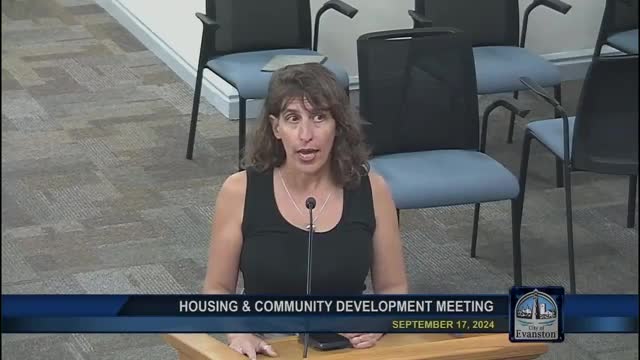Housing Crisis Deepens as Rent Soars to Unaffordable Levels
September 17, 2024 | Evanston, Cook County, Illinois
This article was created by AI summarizing key points discussed. AI makes mistakes, so for full details and context, please refer to the video of the full meeting. Please report any errors so we can fix them. Report an error »

During a recent government meeting, officials discussed the escalating housing crisis in Evanston, where the average rent for a two-bedroom apartment has surged to approximately $2,000. This increase has made it increasingly difficult for families to secure stable housing, particularly those participating in rental assistance programs.
The meeting highlighted the challenges faced by program participants, many of whom are employable but encounter various barriers that complicate their housing situations. To address these issues, the program has implemented comprehensive case management services that extend beyond mere rental assistance. Feedback from annual satisfaction surveys indicates that participants generally feel safe with their case managers and appreciate the support they receive, although there is a notable demand for more social events to foster community engagement.
In response to concerns about the adequacy of rental assistance, officials confirmed that they are adjusting their contributions to align with the rising housing costs. They utilize HUD's small market rent amounts to ensure that assistance reflects the actual rental landscape in Evanston. This adjustment is crucial, as many families struggle to meet the income requirements set by landlords, which often stipulate that tenants must earn three times the rent.
The program also addresses potential discrimination against participants based on their source of income. Landlords are prohibited from denying housing to those receiving rental assistance, ensuring that families can secure housing despite lower incomes. However, the long-term sustainability of housing remains a concern, as many families may find it challenging to afford rent after their assistance ends.
Officials noted that while the program has a high success rate—85% of participants remain housed—there are still families who must relocate due to the prohibitive costs of living in Evanston. The meeting underscored the importance of ongoing support and skill-building initiatives to help families increase their income and maintain housing stability.
The discussion concluded with an emphasis on the program's holistic approach, which not only focuses on housing but also on the well-being of children in these families. Efforts to provide extracurricular activities and support for educational success were highlighted as essential components of the program's mission to foster thriving communities.
The meeting highlighted the challenges faced by program participants, many of whom are employable but encounter various barriers that complicate their housing situations. To address these issues, the program has implemented comprehensive case management services that extend beyond mere rental assistance. Feedback from annual satisfaction surveys indicates that participants generally feel safe with their case managers and appreciate the support they receive, although there is a notable demand for more social events to foster community engagement.
In response to concerns about the adequacy of rental assistance, officials confirmed that they are adjusting their contributions to align with the rising housing costs. They utilize HUD's small market rent amounts to ensure that assistance reflects the actual rental landscape in Evanston. This adjustment is crucial, as many families struggle to meet the income requirements set by landlords, which often stipulate that tenants must earn three times the rent.
The program also addresses potential discrimination against participants based on their source of income. Landlords are prohibited from denying housing to those receiving rental assistance, ensuring that families can secure housing despite lower incomes. However, the long-term sustainability of housing remains a concern, as many families may find it challenging to afford rent after their assistance ends.
Officials noted that while the program has a high success rate—85% of participants remain housed—there are still families who must relocate due to the prohibitive costs of living in Evanston. The meeting underscored the importance of ongoing support and skill-building initiatives to help families increase their income and maintain housing stability.
The discussion concluded with an emphasis on the program's holistic approach, which not only focuses on housing but also on the well-being of children in these families. Efforts to provide extracurricular activities and support for educational success were highlighted as essential components of the program's mission to foster thriving communities.
View full meeting
This article is based on a recent meeting—watch the full video and explore the complete transcript for deeper insights into the discussion.
View full meeting
